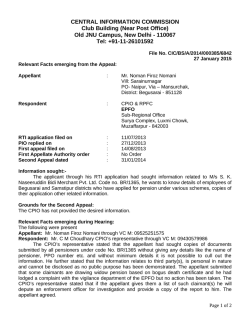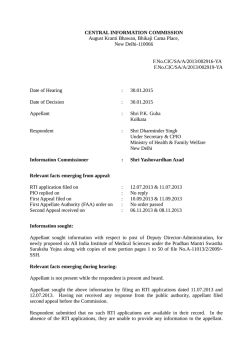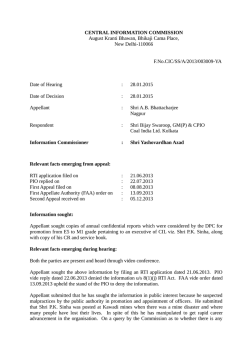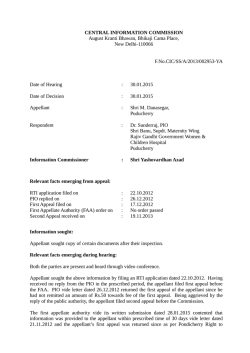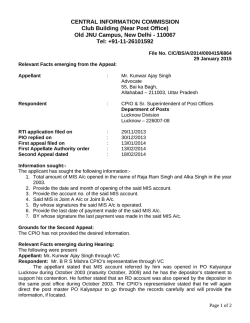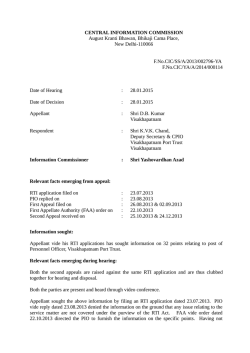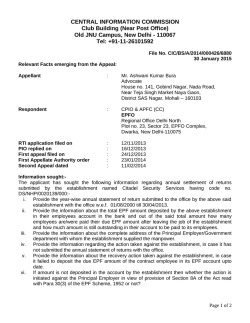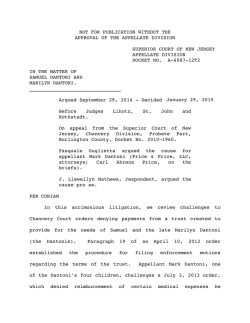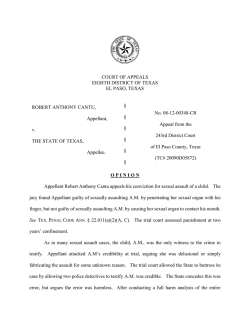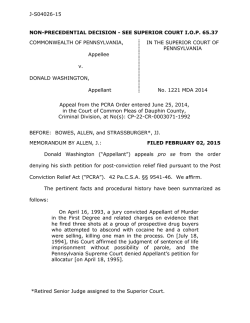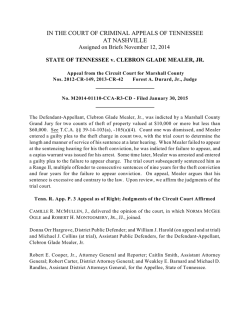
J. S71014/14 * Former Justice specially assigned to the Superior
J. S71014/14 NON-PRECEDENTIAL DECISION – SEE SUPERIOR COURT I.O.P. 65.37 COMMONWEALTH OF PENNSYLVANIA v. MATTHEW McKEE, Appellant : : : : : : : IN THE SUPERIOR COURT OF PENNSYLVANIA No. 842 MDA 2014 Appeal from the Judgment of Sentence, April 15, 2014, in the Court of Common Pleas of Lackawanna County Criminal Division at No. CP-35-CR-0002012-2013 BEFORE: FORD ELLIOTT, P.J.E., PANELLA AND FITZGERALD,* JJ. MEMORANDUM BY FORD ELLIOTT, P.J.E.: FILED FEBRUARY 02, 2015 Matthew McKee appeals from the judgment of sentence of April 15, 2014, following his revocation of probation. We affirm. On October 25, 2013, appellant pled guilty to one count of delivery of marijuana to an individual who was an undercover detective. At his guilty plea hearing, counsel informed the judge that appellant had an outstanding warrant in Michigan for a marijuana possession charge and records for other marijuana possessions from a number of states. On December 4, 2013, appellant was sentenced to three six months’ imprisonment to be followed by one year of probation. to On March 7, 2014, a capias for appellant’s arrest was issued due to a violation of his parole. On April 15, 2014, a Gagnon II hearing was held, and appellant admitted to failing to report to his probation officer and failing to * Former Justice specially assigned to the Superior Court. J. S71014/14 undergo a drug and alcohol evaluation. The trial court noted that appellant also had outstanding warrants from other states. The trial court revoked appellant’s probationary sentence and remanded him to the county jail for 3 to 12 months. The court noted that appellant would “have considerable credit toward that.” (Gagnon II hearing, 4/15/14 at 7.) Appellant filed a notice of appeal on May 13, 2014. The trial court ordered appellant to file a concise statement of errors complained of on appeal within 21 days; appellant timely complied and the trial court has filed an opinion. On appeal, appellant challenges the discretionary aspects of sentencing and raises the following issue for our consideration: “Whether the sentence imposed was inappropriately harsh and excessive and an abuse of discretion for technical violations of probation?” (Appellant’s brief at 4.) The sentence imposed following the revocation of probation “‘is vested within the sound discretion of the trial court, which, absent an abuse of that discretion, will not be disturbed on appeal.’” Commonwealth v. Coolbaugh, 770 A.2d 788, 792 (Pa.Super. 2001), quoting Commonwealth v. Sierra, 752 A.2d 910, 913 (Pa.Super. 2000) (other citations omitted). See also Commonwealth v. Cartrette, 83 A.3d 1030 (Pa.Super. 2013) (en banc) (holding that this court’s scope of review on appeal from a probation revocation sentence includes discretionary sentencing challenges). As the Coolbaugh court observed: -2- J. S71014/14 We recently summarized our standard of review and the law applicable to revocation proceedings as follows: Our review is limited to determining the validity of the probation revocation proceedings and the authority of the sentencing court to consider the same sentencing alternatives that it had at the time of the initial sentencing. 42 Pa.C.S.A. § 9771(b) . . . . Also, upon sentencing following a revocation of probation, the trial court is limited only by the maximum sentence that it could have imposed originally at the time of the probationary sentence. Finally, it is the law of this Commonwealth that once probation has been revoked, a sentence of total confinement may be imposed if any of the following conditions exist: (1) the defendant has been convicted of another crime; or (2) the conduct of the defendant indicates that it is likely that he will commit another crime if he is not imprisoned; or, (3) such a sentence is essential to vindicate the authority of court. 42 Pa.C.S.A. § 9771(c). Id., quoting Commonwealth v. Fish, 752 A.2d 921, 923 (Pa.Super. 2000) (other citations omitted). We also note that the sentencing guidelines do not apply to sentences imposed as the result of probation revocations. Id. (citations omitted). -3- J. S71014/14 An appellant wishing to appeal the discretionary aspects of a probation-revocation sentence has no absolute right to do so but, rather, must petition this Court for permission to do so. [Commonwealth v. Malovich, 903 A.2d 1247, 1250 (Pa.Super. 2006)]; 42 Pa.C.S.A. § 9781(b). Specifically, the appellant must present, as part of the appellate brief, a concise statement of the reasons relied upon for allowance of appeal. Malovich, 903 A.2d at 1250; Pa.R.A.P. 2119(f). In that statement, the appellant must persuade us there exists a substantial question that the sentence is inappropriate under the sentencing code. Malovich, 903 A.2d at 1250; Pa.R.A.P. 2119(f). Commonwealth v. Kalichak, 943 A.2d 285, 289 (Pa.Super. 2008). In general, an appellant may demonstrate the existence of a substantial question by advancing a colorable argument that the sentencing court’s actions were inconsistent with a specific provision of the sentencing code or violated a fundamental norm of the sentencing process. Malovich, 903 A.2d at 1252. While this general guideline holds true, we conduct a case-specific analysis of each appeal to decide whether the particular issues presented actually form a substantial question. Id. Thus, we do not include or exclude any entire class of issues as being or not being substantial. Id. Instead, we evaluate each claim based on the particulars of its own case. Id. Id. at 289-290. In his Rule 2119(f) statement, appellant claims that the sentence imposed for his probation violations was harsh, excessive, and an abuse of discretion for technical violations of probation. The Commonwealth concedes this issue raises a substantial question. See Sierra, 752 A.2d at 913 (“[o]n appeal from a revocation proceeding, we find a substantial -4- J. S71014/14 question is presented when a sentence of total confinement, in excess of the original sentence, is imposed as a result of a technical violation of parole or probation.”). Our review of the record indicates appellant’s technical violations included failing to report to his probation officer immediately upon his release from prison, failing to complete a full drug and alcohol evaluation, and new charges stemming from appellant’s status as a fugitive from justice. (Gagnon II hearing, 4/15/14 at 4.) At the Gagnon II hearing, appellant’s counsel stated that when appellant was released from the Lackawanna County prison, he was under the impression that there were no outstanding warrants. (Id. at 5.) However, that was not the case. We note the Commonwealth does not argue that appellant committed any new crimes. Appellant acknowledges that technical violations of probation can support revocation and a sentence of incarceration under certain conditions; such as, when the violations are flagrant and indicate an inability to reform. See Commonwealth v. Carver, 923 A.2d 495, 498 (Pa.Super. 2007). However, appellant argues “there was no anti-social behavior involved herein” and “his behavior did not threaten anyone.” (Appellant’s brief at 13.) Appellant contends that his lengthy jail sentence of 3 to 12 months was unwarranted. (Id.) In his Rule 1925(a) opinion, the trial court explained its reasons for the sentence imposed: -5- J. S71014/14 This court determined that probation was no longer appropriate for [appellant] since he admitted to failing to report to his probation officer and failing to undergo a drug and alcohol evaluation. There were also a number of out of state detainers against him that were pending even at the time of his guilty plea, so his attorney’s assertion that he was under the impression that there were no outstanding warrants is without merit. This court decided that probation was not effective for [appellant] since he failed to comply with the most basic conditions of his probation. The court thus imposed an appropriate and lawful sentence of incarceration. Trial court opinion, 7/8/14 at 3. Based on the above, the trial court decided appellant’s failure to comply with the basic conditions of his probation was a flagrant violation and indicated an inability to reform. Appellant cites Commonwealth v. Cappellini, 690 A.2d 1220 (Pa.Super. 1997), and Commonwealth v. Riley, 384 A.2d 1333 (Pa.Super. 1978). In Cappellini, we found the record supported revocation of probation where the appellant had ceased drug treatment, refused to submit to drug testing, and failed to meet with his probation officer after specifically being instructed to do so. Id., 690 A.2d at 1225. Herein, appellant points out this court observed that even when a probation violation is present, revocation is not automatic and the focus must remain on whether probation can still be an effective tool for rehabilitation. In Riley, this court reversed, finding the sentencing court relied on inadmissible hearsay when it determined that the appellant’s probation -6- J. S71014/14 should be revoked. Id., 384 A.2d at 1337. Herein, appellant directs our attention to this court’s statement that appellant’s technical violation, in the form of a brief period of unemployment, “would not be sufficient to convince a court that probation has not been an effective vehicle to accomplish rehabilitation and a sufficient deterrent against future anti-social contact.” Id. We do not find these two cases particularly helpful. Cappellini presented a totally different set of facts compared to the instant case. The defendant, an attorney, was a first time offender, was drug dependent, had medical problems, had dropped out of drug treatment but continued to attend Alcoholics Anonymous meetings, and had lied about his use of drugs to his probation officer. Id., 690 A.2d at 1228. Here, appellant was a repeat offender who failed to take the first steps required of him upon his release from prison, i.e., meeting with his probation officer and completing a drug and alcohol evaluation. It would be reaching to say probation was an effective tool for appellant’s rehabilitation when he failed to take the first steps on the road to rehabilitation. In Riley, the defendant was charged with one technical violation of probation, failure to maintain employment. The defendant’s probation officer testified that the defendant worked for one hour and then quit. Id., 384 A.2d at 1336. The defendant testified he did quit his job after working nearly two hours at telephone solicitation making only one dollar, but found -7- J. S71014/14 another job immediately. Id. As previously indicated, we reversed, finding the sentencing court relied on the inadmissible hearsay testimony of the probation officer in determining that probation should be revoked.1 Instantly, appellant admitted he failed to meet with his probation officer and he failed to obtain a drug and alcohol evaluation. (Gagnon II hearing, 4/15/14 at 4-5.) Unlike the defendant in Riley, appellant had not yet done what was required of him when he was arrested. In light of appellant’s failure to make his first appointment with his probation officer and schedule a drug and alcohol evaluation, we find the trial court had a sufficient basis to determine that a sentence of total confinement was required to vindicate the authority of the court. 42 Pa.C.S.A. § 9771(c)(3). See We find no evidence in the record that the judgment exercised was manifestly unreasonable, or the result of partiality, prejudice, bias, or ill-will. Commonwealth v. Perry, 32 A.3d 232, 236 (Pa. 2011) (sentence can be overturned only if it results from manifest unreasonableness, partiality, ill-will, or such lack of support so as to be clearly erroneous). Accordingly, we conclude no abuse of discretion occurred and appellant was properly sentenced. Judgment of sentence affirmed. 1 The Riley decision explained the hearsay as follows: “Firsthand [the probation officer] only knew that appellant had secured the position with the company, and that he was not working there when she dropped by to investigate. The rest of her information was based upon a conversation she had with appellant’s erstwhile employer.” Id. at 1336 n.4. -8- J. S71014/14 Judgment Entered. JosephD.Seletyn,Esq. Prothonotary Date: 2/2/2015 -9-
© Copyright 2026
